- Home
- Will Hobbs
Jason's Gold Page 5
Jason's Gold Read online
Page 5
Some Klondikers weren’t even bothering to unpack their horses at night. Jason could imagine all too well the agony of the mute animals all around him. Most were half-starved to begin with, and there was virtually no grass under the dense forest. Rare was the party that was packing any hay. His wasn’t.
Every mile there were more dead horses along the trail, and from all sides came the croaking of ravens.
The ravens always took the eyes first.
Half an hour rarely went by without a pistol shot from ahead or behind. The third morning, Bailey brought out his own pistol when one of their horses couldn’t rise. The blast tore a hole in Jason’s sense of fair play. He was part of this, he knew, coaxing and dragging these poor creatures to their death. He felt like an accomplice in a crime.
“That’s Porcupine Hill,” he heard somebody say. He looked up to see a jumble of boulders above, gigantic boulders, with horses squeezing between. It took an excruciatingly slow hour to reach those boulders. When they did, a horse was down in the trail not far ahead and neighing in torment. “Broken leg,” came the report down the line. “Turned its leg in a crevice.” Jason saw the butt end of an ax raised high in the air. He turned away, numb and shivering in the drizzle. The dull, bone-crushing thud came like a pronouncement of doom.
It would have taken time and effort to remove the carcass from that spot between the boulders. Men, women, and animals resumed the march right over the horse’s body.
Jason had lost all sense of time. As best he could recall, they’d been under way for six days. It had all run together, connected by shouts and curses and the cloying stench of death. Far below, under the cliffs, the dead horses lay in heaps. They lay everywhere along the sides of the trail, hundreds and hundreds of them. White Pass had gotten a new name—everyone was calling it the Dead Horse Trail.
Jason was ashamed and sick at heart. Still, the nightmare went on. More and more people were retreating down the trail in the muck. A man sat along the side of the trail stone-cold dead, shot through the back. Another man, enraged with his ox, which had become mired in the mud, was burning its belly with a torch. Still the ox couldn’t free itself, only bellow in pain. Jason watched a packhorse walk right off the edge of a cliff—a suicide? Grown men sobbed their hearts out in despair.
And now they were looking at a thousand-foot climb in the rain up streaming rivers of mud. For two hours they waited for their turn to start up it. “Couldn’t we camp right here?” Bailey asked.
Robinson coughed and spat. “No level ground.”
All around them people were retreating. Some were admitting they were beaten. Others were going to try the Chilkoot.
With so many trying to move in opposite directions, it was chaos. “We’ve covered only fourteen miles,” Bailey said to his partner. “Fourteen miles in a week.”
“I’ve seen enough,” Robinson said. “I’m done. Let’s go home.”
Jason helped them turn their horses around, then watched them go. He shouldered his packsack. His brothers were in front of him, not behind. He had sixty dollars in his pocket; he could buy meals from stampeders now if only he could keep moving forward.
A few minutes later he tried to skirt a bad bottleneck in the trail. A man with crazed bloodshot eyes drew his pistol. “You do that and I’ll shoot you dead.”
It was obvious he would.
Jason stayed put. What was he going to do?
Immobilized, he sat along the trail in the drizzle, coughed and shivered. He didn’t know how much more cold and wet and misery he could stand. Two men on horseback were picking their way down the trail. These two didn’t have the stamp of defeat on them. Professional packers, he guessed.
“Did you pack for the Hawthorn brothers, by any chance?”
The first man nodded. “Abe and Ethan Hawthorn.”
Jason was thunderstruck. “When did they get to Lake Bennett?”
“Four days ago.”
“Can I catch them before they get a boat built?”
“Doubtful. It’s like this all the way. Your brothers were lucky to be on the front end, before all this happened.”
“What if I try the Chilkoot?”
“If you travel light, you might catch them. The Chilkoot’s mostly rock, not slime like this.”
“Thanks. Thanks a lot.”
With no hesitation. Jason shouldered his pack and started downhill. People were letting him around, as long as he was retreating. Finally he could fly, put this nightmare behind him.
Descending Porcupine Hill, he passed through a slot between two boulders. On one side of the trail was a horse’s head, on the other its hind legs. This, he realized, was the horse he’d seen killed with the ax blow to the head. This was all that remained: the rest had been ground into the mud.
A few minutes later, where a stream plunged across the trail, he came across a man in an utter rage, a burly man with red suspenders who seemed to be holding one of his dogs underwater. That’s exactly what he was doing—he was drowning the dog!
Jason’s eyes went to the bodies of three dead dogs among the rocks downstream. In the cursing, roaring height of passion, the man was drowning every one of his dogs!
The human serpent, meanwhile, was passing by with only mild curiosity.
Jason couldn’t pass by. Mouth agape, he stepped away from the line. The dog in the madman’s huge hands was dead now; it floated downstream toward the others. With a bearlike roar, the man turned to unbuckle his fifth and last dog from the tug line. It was a black-and-white husky, a big male, big enough that it should have been trying to resist.
Jason was trembling. His face was flushing hot, his fists clenching and unclenching helplessly.
Like the horses on the trail, the dog seemed to recognize its fate, and had accepted it. The husky simply lay on its side and rolled its eyes away from the spectacle of the man who’d lost his reason. The man with the red suspenders grabbed up the dog by its harness and plunged its head and shoulders under the water, pinning the husky with his knee.
Jason could stand no more. He’d seen too much cruelty, had played his part in it. No matter the consequences, he had to do something. He threw his pack to the ground and waded into the creek hollering, all out of control. Seizing the man by his collar and an elbow, Jason spun him around and screamed “No! No!” into his face.
The huge man rose menacingly over Jason, and as he rose he released the dog. Eyes blazing like burning coals, he pulled out a pistol, put it to the side of Jason’s head, and cocked it.
“If you don’t want him,” Jason pleaded, “leave him be. I’ll take him!”
The man pushed him away, then looked at him crazily. A weird smile began to play at his cracked lips. “Take him, then. He’s yours!”
The dog drowner started laughing maniacally. “He won’t pull! Two hundred dollars and he won’t pull. Take him!”
Jason tugged at the dog’s harness. “Let’s go,” he said to the animal.
His eyes met the eyes of the dog, and Jason recognized a flicker of hope in their amber depths. “Come with me,” Jason said. The husky got to its feet and waded tentatively out of the stream, keeping a wary eye on its tormenter. Jason grabbed up his packsack and started walking down the trail. “Come on,” he encouraged, beckoning. The husky came with him, and neither looked back.
A few moments later there came an explosive pistol shot. Jason jerked his head around, wondering if he was being shot at. The big man had blown his brains out.
NINE
In little more than a week, Skagway had grown dramatically. The buildings along Broadway were virtually completed.
Jason couldn’t resist the temptation to eat at a restaurant, even if a meal cost twelve times what it would have in Seattle. At a thrown-together establishment called the Midas Cafe, he ordered a New York steak and handed over three dollars.
As he took his first bite, he detected a slight rancid odor. But then he decided that the odor was coming from him. He and his clothes were full
of the scent of dead horses.
As Jason ate he listened to the subdued conversation of two men at the table behind him. There was a secretive tone to their voices that made him strain to hear what they were saying. They’d been in Skagway a week, he understood that much, trying to arrange to have their outfits packed over White Pass—the Dead Horse Trail. “I believe we’ve landed in hell,” one of them said.
“A shooting every night!”
“It’s not just the gamblers. Anyone you do business with might be a swindler. There’s even one posing as a preacher. Some of their victims have barely stepped off the ships.”
“Going bust on the trail is one thing, but being cheated out of your funds before you even set out is another. Seen all the FOR SALE signs down by the water—people selling their outfits off cheap?”
“Everything from fur hats to Winchesters. People just trying to raise enough money to get back to Seattle. And the law—they do nothing.”
Suddenly the other voice went down to a bare whisper. “People are saying that the marshal is working for the boss of Skagway. If you report a crime, you might be digging your own grave.”
“So, who is the boss of Skagway?”
“That southerner who poses as a philanthropist—Jeff Smith.”
Captain Jefferson Randolph Smith, Jason almost said aloud. He fought the impulse to turn around and tell those two men about his own encounter with Smith and his bunch. Instead, he chewed slowly, listened intently, said nothing.
“They say Smith gives people the fare home, sometimes, out of his own pocket.”
“After his men have cheated or robbed them!”
“There’ll be many a dry eye at his funeral.”
“I heard it whispered today, who he really is….”
“What do you mean?”
There was a pause. “I heard tell he’s a famous con man from the mining camps in Colorado by the name of Soapy Smith. Didn’t even bother to change his name. Brought some of his accomplices with him and recruits others every day. They’re everywhere!”
“All I know is, we better get out of here while we still can. Better try the Chilkoot, don’t you think?”
Jason had only a small piece of his steak left. He dangled the meat above the big husky at his feet. The dog sniffed it, took it gingerly, gummed it, then dropped it to the floor uneaten.
“Thought you were hungry,” Jason said. “You’d prefer fish? I’ll try to find you some. What do you say we go looking for packsacks for you? Would you carry for me, over the Chilkoot?”
The dog’s amber eyes, all the while he spoke, remained locked on his.
“You’ll think about it? Good, let’s go!”
At the foot of Broadway, Jason paused to take in the raw, bustling drama. There were more ships offshore than before, more arrivals streaming onto the beach, more mountains of gear, more dogs and horses, more confusion. As he stood there, shouts erupted in front of the first building on the street, a telegraph office he didn’t remember from before.
“Come out of there!” a man in the middle of the street demanded indignantly. He was waving a telegram in the air as a boy of no more than ten clung to his side, looking fearfully at the people gathering around. “Father,” the boy pleaded.
“Come out and show the good people your telegraph lines!” his father raged. “Where are the lines? Where are the poles? This answer from my wife in Sacramento—it’s a phony! I didn’t come all this way to be cheated! Pay once to send your telegram, pay a second time to receive the so-called reply. I may have just got here only a few hours ago, but I wasn’t born yesterday. Show me the telegraph wires!”
Someone was coming out of the office, scowling. It was Kid Barker!
Kid Barker, with his puffy childlike face, put his hands on his hips and nodded to several men standing at the edge of the crowd. Jason saw one of them slip a badge out of his pocket and pin it to his vest. Seconds later, the protesting newcomer was hustled away by the elbows. The crowd murmured at the sight of the man being led away, with his son crying and running to catch up.
The boy’s father resisted suddenly, shook loose of the two men who had him by the arms. Jason saw the flash of a nightstick, heard the whack on the man’s head, saw the blood stream down the side of his face. Jason glanced back for only the briefest moment at Kid Barker, who was watching from a safe distance with a smug grin on his face. Jason longed for the opportunity to turn the tables on him, but he didn’t know how it could be done.
Jason turned quickly away. He couldn’t afford to be recognized. Everyone on the street melted away. It was over.
At the beach, amid the FOR SALE signs, Jason found a pair of dog panniers made of canvas and large enough to match the husky’s great size. At bargain prices, he bought five pounds of dried fruit and five pounds of jerky, along with a dozen yeast cakes, and began to load up the dog’s packsacks and his own for his sprint over Chilkoot Pass.
Then he set about looking for winter clothes. He wanted to be prepared for the cold when he joined up with his brothers; there was no telling what might be available in Dawson City. He bought three pairs of wool-lined moose-hide mittens, a beaver hat with fold-down earflaps, a heavy wool sweater, overalls, two thick wool blankets to replace his ruined bedroll, wool socks, a splendid pair of sealskin mukluks for winter boots, and a suit of waterproof oilskin to wear over his father’s mackinaw and his wool trousers.
All of a sudden Jason felt a twinge in his gut, sharp like the twist of a knife. He took a deep breath. It passed and was immediately replaced by a dull ache, like he’d swallowed gunpowder.
He willed himself to concentrate on what still needed to be done. He bought a tarp and some rope, so he’d be able to sleep dry. There was the dog to think about too now. The big husky would need dried salmon and plenty of it. Jason had seen a man on the Dead Horse Trail with a whole bale of it, the kind the Indians dried in two long strips connected by the tail. He asked around, found an old woman who told him it was for sale at the trading post in Dyea.
He packed the panniers that he hoped the husky would carry for him, arranging a blanket inside of each so that nothing would jab the dog in the sides. They’d head over to Dyea next.
“I need a name for you.” Jason said aloud. “I had a dog once, a long time ago…not for very long—a puppy, that’s all he was.”
He was about to say the name of that long-lost dog out loud. But he had never allowed himself that in all these years. It was a sore spot, a wound that had never healed.
When he finished packing the panniers, they were bulging. He lifted them by the yoke, guessed their combined weight at forty pounds.
Jason talked gently to the dog as he lowered the yoke onto the little saddle blanket he’d placed along the husky’s back. To his surprise, the dog stood perfectly still, even gave his hand a quick lick. Jason whispered, “I knew you’d carry for me.”
He walked a little with the dog, who seemed unbothered by the bulky panniers. Jason’s new companion stayed close to his side. The husky’s face, looking up, was so expressive: black above, white below, just like his entire body. Those amber eyes had a lot of gold in them.
Jason petted the husky across the wide crown of his head. The dog nuzzled him affectionately and wagged his great tail, which he carried curved up over his back.
“You were someone’s pet. weren’t you? Someone’s best friend? We can be that too.”
Jason stooped to fasten the panniers to the dog’s harness. His stomach was cramping badly now, and he was breaking out in a sweat. I really am sick, he thought. Something I ate?
The New York steak, he realized. It really had gone bad. For a second he even wondered if it could have been rotten horse flesh he’d eaten, and immediately there seemed little doubt. Welcome to Skagway!
No wonder the husky wouldn’t touch it.
Got to keep going, he told himself. It was already midafternoon and he still had to find a scow that would take him across to Dyea, but suddenly he collapsed i
n agony.
In the middle of the human anthill, he lay writhing like a snake with its head cut off. The pain reached a crescendo, and then his mind switched off like an electric light. He knew nothing more.
He didn’t know where he was or how much time had passed. He was too sick to know who he was. That he hurt, that he was in a fog of pain, was all he knew.
Two faces kept coming and going in the fog, looking down at him. He had no idea who they belonged to.
One was the face of a man with an enormous gray beard.
The other was the face of a girl, a girl with wavy black hair.
Their faces and their voices came and went in the fog, but he couldn’t place them.
There was a third face too, the black-and-white face of a sled dog, which would appear and disappear.
The face of the dog floating in his delirium suddenly melted into the face of a puppy, a black-and-white mutt with floppy ears. It was running toward him.
He would struggle to rise, but the man or the girl would hold him back and tell him to stay where he was. He had no idea where he was or what was happening. “Everything’s going to be all right,” the girl kept saying, but it wasn’t. The little puppy was about to be crushed under the wheels of a wagon. His brothers could see it too, but they were powerless to prevent it. “King!” Jason shouted at the top of his lungs. “King, stop! King, King!”
Then he was standing by an open grave, watching his father’s casket sink down into the ground. His oldest brother, Abraham, always so strong, was shaking like a leaf. Ethan, who always had a joke to tell, was bawling like a small child.
Jason looked straight down into the grave. It was a mile deep. It had no bottom at all.
“Here,” Abraham said, shoving the puppy into his hands. “Take this dog and give it a name and take good care of it. Everything will be all right.”
Whenever the fog thinned, Jason was aware of the girl with hair black as a raven’s wing or the man with the enormous gray beard putting a moist towel to his forehead. They propped him up. They made him take sips of water from a glass.

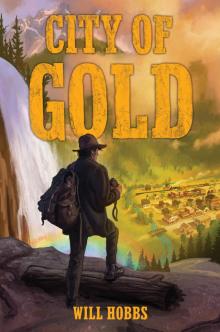 City of Gold
City of Gold Kokopelli's Flute
Kokopelli's Flute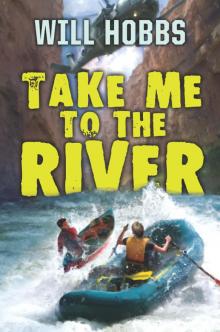 Take Me to the River
Take Me to the River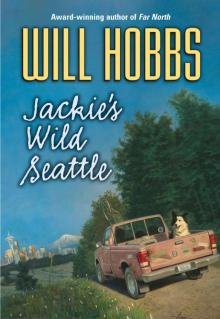 Jackie's Wild Seattle
Jackie's Wild Seattle The Maze
The Maze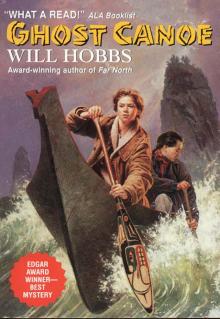 Ghost Canoe
Ghost Canoe Never Say Die
Never Say Die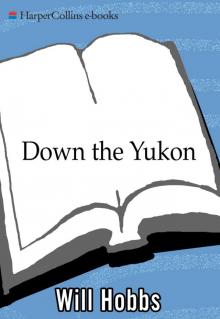 Down the Yukon
Down the Yukon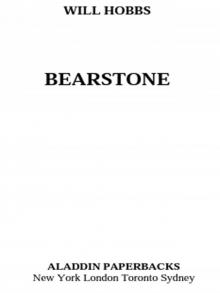 Bearstone
Bearstone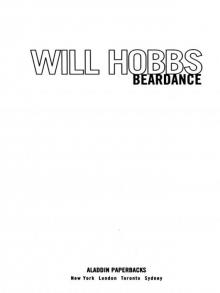 Beardance
Beardance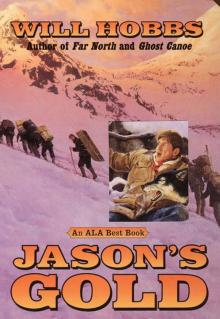 Jason's Gold
Jason's Gold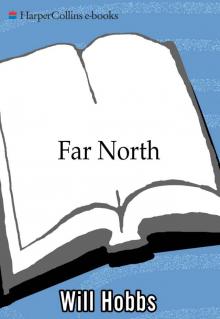 Far North
Far North The Big Wander
The Big Wander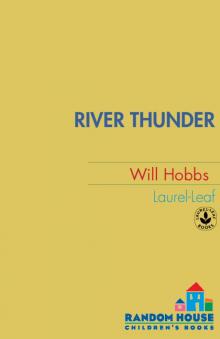 River Thunder
River Thunder Downriver
Downriver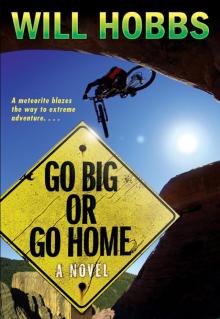 Go Big or Go Home
Go Big or Go Home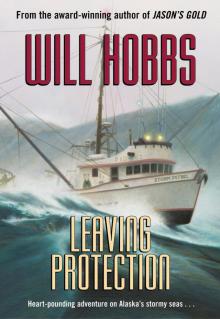 Leaving Protection
Leaving Protection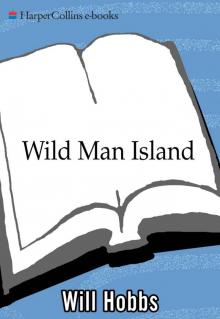 Wild Man Island
Wild Man Island